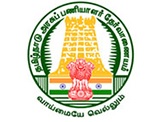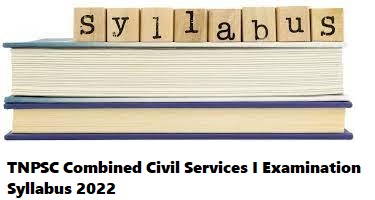TNPSC Combined Civil Services –I Examination Syllabus 2022
Organisation : Tamil Nadu Public Service Commission (TNPSC)
Exam Name : TNPSC Combined Civil Services –I Examination 2022
Services : Group – I Services
Announcement : TNPSC Combined Civil Services –I Exam Syllabus 2022
Preliminary Exam Date : 30th September, 2022
Website : https://www.tnpsc.gov.in/English/Notification.aspx
What is TNPSC Group- I Services Exam?
TNPSC Combined Civil Services Examination- I (Group- I Services ) is conducted by Tamil Nadu Public Service Commission. Applicants should possess a degree of any of the Universities incorporated by an Act of the Central or State Legislature in India or any other Educational Institutions established by an Act of Parliament or declared to be deemed as a University under Section 3 of the University Grants Commission Act, 1956.
Related / Similar Syllabus : TNPSC Field Surveyor FS & Draftsman Recruitment Syllabus 2022

Syllabus For TNPSC Group- I Services Exam
The Syllabus For TNPSC Group- I Services Exam are given below,
Unit-I: General Science
(i) Scientific Knowledge and Scientific temper – Power of Reasoning – Rote Learning Vs Conceptual Learning – Science as a tool to understand the past, present and future.
(ii) Nature of Universe – General Scientific Laws – Mechanics Properties of Matter, Force, Motion and Energy – Everyday application of the basic principles of Mechanics, Electricity and Magnetism, Light, Sound, Heat, Nuclear Physics, Laser, Electronics and Communications.
(iii) Elements and Compounds, Acids, Bases, Salts, Petroleum Products, Fertilizers, Pesticides.
(iv) Main concepts of Life Science, Classification of Living Organisms, Evolution, Genetics, Physiology, Nutrition, Health and Hygiene, Human diseases.
(v) Environment and Ecology.
Unit-II: Current Events
(i) History – Latest diary of events – National symbols – Profile of States – Eminent personalities and places in news – Sports Books and authors.
(ii) Polity – Political parties and political system in India – Public awareness and General administration – Welfare oriented Government schemes and their utility, Problems in Public Delivery Systems.
(iii) Geography – Geographical landmarks.
(iv) Economics – Current socio – economic issues.
(v) Science – Latest inventions in Science and Technology.
(vi) Prominent Personalities in various spheres- Arts, Science, Literature and Philosophy.
UNIT- III: Geography Of India
(i) Location – Physical features – Monsoon, Rainfall, Weather and Climate – Water Resources – Rivers in India – Soil, Minerals and Natural resources – Forest and Wildlife – Agricultural pattern.
(ii) Transport – Communication.
(iii) Social Geography – Population density and distribution – Racial, Linguistic Groups and Major Tribes.
(iv) Natural calamity – Disaster Management – Environmental pollution: Reasons and preventive measures – Climate change – Green energy.
UNIT– IV: History And Culture Of India
(i) Indus valley civilization – Guptas, Delhi Sultans, Mughals and Marathas – Age of Vijayanagaram and Bahmani Kingdoms -South Indian history.
(ii) Change and Continuity in the Socio – Cultural History of India.
(iii) Characteristics of Indian culture, Unity in diversity – Race, language, custom.
(iv) India as a Secular State, Social Harmony.
UNIT-V: Indian Polity
(i) Constitution of India – Preamble to the Constitution – Salient features of the Constitution – Union, State and Union Territory.
(ii) Citizenship, Fundamental rights, Fundamental duties, Directive Principles of State Policy.
(iii) Union Executive, Union legislature – State Executive, State Legislature – Local Governments, Panchayat Raj.
(iv) Spirit of Federalism: Centre – State Relationships.
(v) Election – Judiciary in India – Rule of law.
(vi) Corruption in public life – Anti-corruption measures – Lokpal and LokAyukta – Right to Information – Empowerment of women – Consumer protection forums, Human rights charter.
UNIT-VI: Indian Economy
(i) Nature of Indian economy – Five year plan models – an assessment – Planning Commission and Niti Ayog.
(ii) Sources of revenue – Reserve Bank of India – Fiscal Policy and Monetary Policy – Finance Commission – Resource sharing between Union and State Governments – Goods and Services Tax.
(iii) Structure of Indian Economy and Employment Generation, Land reforms and Agriculture – Application of Science and Technology in Agriculture – Industrial growth – Rural Welfare Oriented Programmes – Social problems – Population, Education, Health, Employment, Poverty.
UNIT-VII: Indian National Movement
(i) National Renaissance – Early uprising against British rule – Indian National Congress – Emergence of leaders – B.R.Ambedkar, Bhagat Singh, Bharathiar,
V.O.Chidambaranar, Jawaharlal Nehru, Kamarajar, Mahatma Gandhi, Maulana Abul Kalam Azad, Thanthai Periyar, Rajaji, Subash Chandra Bose, Rabindranath Tagore and others.
(ii) Different modes of Agitation: Growth of Satyagraha and Militant Movements.
(iii) Communalism and partition.
UNIT- VIII: History, Culture, Heritage and Socio – Political Movements in Tamil Nadu
(i) History of Tamil Society, related Archaeological discoveries, Tamil Literature from Sangam age till contemporary times.
(ii) Thirukkural : (a) Significance as a Secular literature
(b) Relevance to Everyday Life
(c) Impact of Thirukkural on Humanity
(d) Thirukkural and Universal Values – Equality, Humanism, etc
(e) Relevance to Socio – Politico – Economic affairs
(f) Philosophical content in Thirukkural
(iii) Role of Tamil Nadu in freedom struggle – Early agitations against British Rule – Role of women in freedom struggle.
(iv) Evolution of 19th and 20th Century Socio-Political movements in Tamil Nadu – Justice Party, Growth of Rationalism – Self Respect Movement, Dravidian Movement and Principles underlying both these movements, Contributions of Thanthai Periyar and Perarignar Anna
UNIT – IX: Development Administration in Tamil Nadu
(i) Human Development Indicators in Tamil Nadu and a comparative assessment across the Country – Impact of Social Reform movements in the Socio – Economic Development of Tamil Nadu.
(ii) Political parties and Welfare schemes for various sections of people – Rationale behind Reservation Policy and access to Social Resources – Economic trends in Tamil Nadu – Role and impact of social welfare schemes in the Socio – Economic Development of Tamil Nadu.
(iii)Social Justice and Social Harmony as the Cornerstones of Socio – Economic development.
(iv) Education and Health systems in Tamil Nadu.
(v) Geography of Tamil Nadu and its impact on Economic growth.
(vi) Achievements of Tamil Nadu in various fields.
(vii) E-governance in Tamil Nadu.
UNIT-X: Aptitude And Mental Ability
(i) Simplification – Percentage – Highest Common Factor (HCF) – Lowest Common Multiple (LCM).
(ii) Ratio and Proportion.
(iii) Simple interest – Compound interest – Area – Volume – Time and Work.
(iv) Logical Reasoning – Puzzles – Dice – Visual Reasoning – Alpha numeric Reasoning – Number Series.

PAPER – II – General studies
UNIT- I: MODERN HISTORY OF INDIA AND INDIAN CULTURE
Advent of European invasion ‐ Expansion and consolidation of British rule – Early
uprising against British rule ‐ 1857 Revolt – Indian National Congress ‐ Growth of
militant movements ‐ Different modes of agitations – Emergence of national leaders
‐ Gandhi, Nehru, Tagore, Netaji, Moulana Abulkalam Azad, Ambedkar and Patel ‐
Era of different Acts & Pacts ‐ Second World War & final phase struggle ‐
Communalism led to partition.
Effect of British rule on socio‐economic factors ‐ National renaissance – Socio
religious reform movements.
India since independence ‐ Characteristics of Indian culture ‐ Unity in diversity
‐ Race, Language, Religion Custom ‐ India: a secular state ‐ Organizations for fine
arts, dance, drama and music.
Role of Tamil Nadu in freedom struggle ‐ Bharathiar, VOC, Subramania Siva,
Rajaji, Periyar and others – Political parties and Welfare schemes.
Latest diary of events: National and International ‐ National symbols- Eminent
personalities & places in news ‐ Sports & Games ‐ Books & Authors ‐ Awards &
Honours ‐ Cultural panorama ‐ Latest historical events – Latest terminology ‐
Appointments ‐ who is who?
UNIT- II: Social Issues In India & Tamil Nadu
Population Explosion ‐ Unemployment issues in India & Tamil Nadu ‐ Child Abuse
& Child Labour – Poverty – Rural and Urban Sanitation – Illiteracy.
Women Empowerment ‐ Role of the Government in Women Empowerment –
Social injustice to Women ‐ Domestic violence, Dowry menace, Sexual assault – Role
of women and women’s organisations
Social changes in India – Urbanization and its impact on the society – Problems
and remedies ‐ Impact of violence on Society – Religious violence, Terrorism and
Communal violence ‐ Regional Disparities ‐ Problems of Minorities ‐ Human Rights issues.
Education – Linkage between Education and Social Development ‐ Community
Development Programmes ‐ Employment Guarantee Schemes ‐ Self Employment
and Entrepreneurship Development ‐ Role of N.G.Os in Social Welfare – Government Policy on Health.
Welfare Schemes for vulnerable sections of the population by the Central and State governments and their performance.
Syllabus : http://www.syllabus.gen.in/uploads/pdf2022/2765-syllabus.pdf
PAPER – III – General studies
UNIT – I: Indian Polity And Emerging Political Trends Across The World Affecting India
Constitution of India: Historical background – Making of the Indian Constitution – Preamble – Salient features of the Indian Constitution – Fundamental Rights and Fundamental Duties – Directive Principles of State Policy – Schedules to the Indian Constitution.
Union Executive: President, Vice – President, Prime Minister and Council of Ministers, Attorney General of India.
Union Legislature: Parliament: Lok – Sabha and Rajya – Sabha – Composition, Powers, Functions and Legislative procedures.
Union Judiciary: Structure, Powers and Functions of the Supreme Court – Judicial Review – Latest Verdicts.
State Executive: Governor, Chief Minister – Speaker and Council of Ministers, Advocate General of the State.
State Legislature: State Legislative Assembly – Organization, Powers and Functions.
State Judiciary: Organisation, Powers and Functions of High Courts, District Courts and Subordinate Courts.
Local Government: Historical Development – Features and working of 73rd and 74th Constitutional Amendment Act, 1992.
Union Territories: Evolution of States and Union Territories – Administration of Union Territories.
Federalism in India: Centre – State Relations – Centre – State Administrative Relations – Centre – State Legislative Relations and Centre – State Financial Relations.
Civil Services in India: Historical background – Classification of Civil Services – Recruitment & Training of Civil Servants.
State Services: Classification of State Services and Recruitment.
Official Language: Constitutional provision – Official Language Act, VIII Schedule to the Constitution.
Amendments: Major Amendments to the Indian Constitution.
UNIT – II: Role And Impact Of Science And Technology In The Development Of India
Science and Technology – Role, Achievements and Developments – Their
applications and effects in everyday life ‐ Energy ‐ Conventional and Non-
conventional – Self-sufficiency ‐ Oil exploration ‐ Defence Research Organizations
and other science and technology institutions – Ocean Research and Development –
Role and Functions.